Life Sciences News
See our Latest Journal Publications
Warwick School of Life Sciences - Funded PhD Opportunities
The School of Life Sciences combines the University of Warwick’s renowned research and teaching excellence to provide outstanding, diverse and multidisciplinary training in the Life Sciences. World-class facilities and internationally-recognised scientists develop pioneering research ideas and innovations in a wide range of disciplines – from the study of single molecules to models of entire ecosystems. We apply our expertise to solving major global challenges in areas such as food security, disease control, bioenergy, systems biology, neurobiology and climate change. The school has a number of funded postgraduate studentship opportunities to start in October 2017.
Synthetic Biology Centre for Doctoral Training (SynBioCDT) – 4 year studentships
This centre is a collaboration between the Universities of Warwick, Oxford and Bristol. We encourage PhD applications from students with a wide range of academic backgrounds, including Engineering, Biology, Biochemistry, Physics, Plant Sciences, Chemistry, Statistics, Mathematics and Computing.
Warwick SynBio CDT webpage
Application deadline Round 1: 18 November 2016
Application deadline Round 2: 13 January 2017
CENTA Doctoral Training Partnership – 3.5 year studentships
Central England NERC Training Alliance (CENTA) is a consortium of Universities and research institutes that are working together to provide excellence in doctoral research training in Environmental Science. PhD project themes include: Anthropogenic Impact and Environmental Sustainability, Evolution of Organisms and Ecosystems, Dynamic Earth, Organisms, ’omics and biogeochemistry
Warwick CENTA webpage
Application deadline 23 January 2017
Warwick Chancellor's International Scholarship – 3.5 year studentships
This competition is open to Overseas students. Scholarships will be awarded to the most outstanding international PhD applicants. Students are strongly encouraged to identify a supervisor and develop a research proposal before completing an application form. (see the website for a list of some possible PhD projects).
Application Deadline 18 January 2017
MIBTP Doctoral Training Partnership – 4 year studentships
The Midlands Integrative Biosciences Training Partnership (MIBTP) is a doctoral training partnership between the Universities of Warwick, Birmingham and Leicester. The MIBTP has an ambitious vision to deliver innovative, world class research across the Life Sciences to boost the growing Bioeconomy in the Midlands and across the UK.
PhD Studentship projects will be focussed in vital research areas such as food security, bio-energy and quantitative biology. Students from a wide diversity of academic backgrounds are encouraged to apply. Projects are available for those with creative drive in both theoretical (IT and mathematical) and experimental (biology, biomedicine, chemistry, biotechnology) research.
MIBTP website
Application deadline 8 January 2017
Industrial Collaboration PhD Studentships linked with MIBTP
These studentships are an excellent opportunity to initiate new industrial contacts, develop existing links and help enhance the impact of research. The BBSRC-funded iCASE studentships are designed to provide students with a first-rate challenging research training experience within the context of a mutually-beneficial research collaboration between academic and non-academic partner organisations.
MIBTP website
Lameness treatment guidelines for sheep save UK farmers £700M
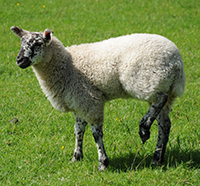 Evidence provided by researchers, led by Professor Laura Green from the School of Life Sciences, has helped cut the number of lame sheep in the UK national flock by half, saving the industry £700M over ten years and preventing 7.5 million sheep from becoming lame every year.
Evidence provided by researchers, led by Professor Laura Green from the School of Life Sciences, has helped cut the number of lame sheep in the UK national flock by half, saving the industry £700M over ten years and preventing 7.5 million sheep from becoming lame every year.
Read more about the BBSRC funded study
How viruses might influence estimates of global warming
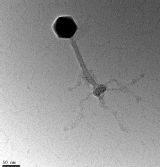 The tiniest life forms on Earth have a big impact on the way carbon dioxide is cycled between the atmosphere and the ocean, new research from the University of Warwick has found.
The tiniest life forms on Earth have a big impact on the way carbon dioxide is cycled between the atmosphere and the ocean, new research from the University of Warwick has found.
These life forms are viruses of some of the most abundant organisms on our planet: marine cyanobacteria.
The new research, Viruses Inhibit CO2 Fixation in the Most Abundant Phototrophs on Earth and published by Current Biology, demonstrates that the viruses of these cyanobacteria, cyanophages, use these genes to maintain the so-called “light-reactions” of photosynthesis, while shutting down the “dark-reactions”.
Cyanobacteria have had an incredible impact on the Earth by seeding the atmosphere with oxygen about 3 billion years ago, allowing for the existence of life as we know it. Today, this same process that acts to produce oxygen sucks up CO2 from the atmosphere.
Professor David Scanlan of the University of Warwick’s School of Life Sciences, the lead author of the research, said: “CO2 is a key greenhouse gas directly implicated in global warming. Given CO2 is converted into organic compounds during photosynthesis, factors that directly affect this process play a key role in modulating atmospheric CO2 levels.”
“We have known about these viruses for several decades” said Scanlan. “Things changed in 2003 when we discovered that these viruses have stolen genes from cyanobacteria that participate in photosynthesis. Now we have shown that these viruses modify photosynthesis during the demise of their host”.
On a global scale this results in losses of 0.02-5.39 Pg C yr-1 to viral induced inhibition of CO2 fixation. Per annum this upper figure is approximately 10% of the total CO2 fixed in the marine environment.
This data has important implications for measuring greenhouse gasses. Professor Scanlan explains:
“Quantification of net primary productivity is usually determined by directly measuring cyanobacterial photosynthesis and these methods rely on the coupling of light reactions to CO2 fixation”.
“In virus infected cells, this assumption of light reactions linked to CO2 fixation is incorrect and can therefore lead to a significant over estimation of CO2 fixation. This has very important implications for our understanding, and the estimates of, global warming.”
Contacts:
Professor Dave Scanlan
Email:
Tel: + 44 24 76 528363
Dr Andrew Millard
Email: Andrew.Millard@warwick.ac.uk
Tel: + 44 24 76 523589
The Elizabeth Creak Charitable Trust and the School of Life Sciences
The School of Life Sciences welcomes Professor Murray Grant, who recently took up the position of Elizabeth Creak Chair in Food Security and, thanks to a generous donation from the Elizabeth Creak Charitable Trust, researchers teach children about soil at the Kenilworth Show.
Plants remember stress to help protect themselves
A new generation of plants better adapted to mitigate the effects of environmental change could be created following a fundamental step towards understanding how plants are able to retain a memory of stress exposure.
The research, led by Dr Jose Gutierrez-Marcos and published in the journal eLife, provides the first compelling evidence that plants have evolved ways to remember previous exposures to stress, in this case high salinity conditions, which can help subsequent progenies withstand the same stress in future.
Selection pressures push plants over adaption cliff – new study has significant implications for how we address rapid climate change
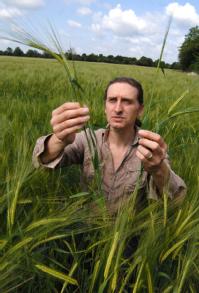 New simulations by researchers at the University of Warwick and UCL’s Institute of Archaeology of plant evolution over the last 3000 years have revealed an unexpected limit to how far useful crops can be pushed to adapt before they suffer population collapse. The result has significant implications for how growers, breeders and scientists help agriculture and horticulture respond to quickening climate change.
New simulations by researchers at the University of Warwick and UCL’s Institute of Archaeology of plant evolution over the last 3000 years have revealed an unexpected limit to how far useful crops can be pushed to adapt before they suffer population collapse. The result has significant implications for how growers, breeders and scientists help agriculture and horticulture respond to quickening climate change.
The research led by Professor Robin Allaby from the School of Life Sciences has just been published in the journal Evolutionary Genomics and is entitled "Evolutionary Genomics Surprisingly Low Limits of Selection in Plant Domestication".
Read the full Press Release
IFSTAL Away Day Success
On Saturday 5 March, Oxford University hosted the first IFSTAL (Innovative Food Systems Teaching and Learning) Away Day, where students from Warwick, Reading, Oxford, City and LCIRAH were able to meet and network with fellow students and food sector professionals, including Gavin Milligan – Group Sustainability Director at William Jackson Food and Angela Baker – Deputy Director, Health and Wellbeing, Public Health England. Two Masters students and two PhD students from the School of Life Sciences were involved in the day, presenting their own research and working with others to solve ‘real’ workplace scenarios in a relaxed and fun environment.
IFSTAL is an interactive training programme designed to improve postgraduate knowledge and understanding of the food system through numerous activities and events throughout the year, as well as an interactive Moodle site.
Want to get involved? To join you must be a postgraduate registered at Warwick University (or one of our partner institutes), although some events will be open to all.
Email Kelly Reed at IFSTAL-Warwick@Warwick.ac.uk to be put on the mailing list.
Alternatively find us on Facebook, Moodle and Twitter – simply search for IFSTAL.
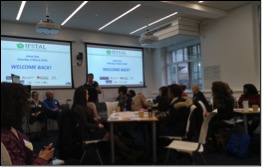 |
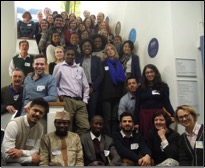 |
Summer research placements in Entomology and Pathology
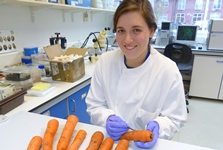 The School of Life Sciences has a number of summer research placements available in Entomology and Plant Pathology during the summer vacation of 2016. The placements are funded by the BBSRC through its Strategic Training Awards for Research Skills (STARS) scheme and provide training in strategically important and vunerable skills for bioscientists.
The School of Life Sciences has a number of summer research placements available in Entomology and Plant Pathology during the summer vacation of 2016. The placements are funded by the BBSRC through its Strategic Training Awards for Research Skills (STARS) scheme and provide training in strategically important and vunerable skills for bioscientists.
The 10-week placements are for second year undergraduate students enabling them to join a research group in Life Sciences and undertake a small research project related to the group's activities.
Each student will receive a bursary of £2000 (£200 per week).
For further details and how to apply see the Summer research placements flyer (pdf).
The closing date for applications is 18 April.
BBSRC Press Release 'First STARS awards target vunerable skills in the life sciences'
Professor Nicholas Dale receives MRC Discovery Award
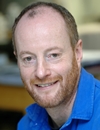 Innovative University of Warwick research will be accelerated thanks to funding from the Medical Research Council (MRC) to take ground-breaking ideas into industry and out to patients. A Discovery Award of £973k will support vivo microscopy researchers investigate the dynamic activity of individual neural cells during complex behaviours.
Innovative University of Warwick research will be accelerated thanks to funding from the Medical Research Council (MRC) to take ground-breaking ideas into industry and out to patients. A Discovery Award of £973k will support vivo microscopy researchers investigate the dynamic activity of individual neural cells during complex behaviours.
Led by Professor Nicholas Dale, researchers will investigate the activity of neural cells deep in the mammalian brain that help control complex behaviours such as feeding and breathing and the operation of the body’s circadian clock.
SBRI funding received to develop diagnostic biosensors for strokes
Sarissa Biomedical, a spin-out company established by Professor Nick Dale, Ted Pridgeon Professor of Neuroscience in the School of Life Sciences, has been awarded £150,000 from Innovate UK’s Small Business Research Initiative (SBRI). Sarissa Biomedical has pioneered highly sensitive analytical devices known as microelectrode biosensors, which can be used to monitor in real-time the levels of purines - neurochemicals that influence the function of the nervous system. These biosensors have been used to demonstrate that purines are elevated in the blood of stroke patients compared to healthy controls.
Stroke is one of the leading causes of death and disability in the UK – in 2010 there were an estimated 150,000 strokes and 50,000 deaths attributable to stroke. Stroke currently costs the UK economy approximately £9billion per year in health and social care costs. Rapid treatment of ischaemic strokes to remove the blockage of cerebral circulation can allow perfect recovery and avoid lasting disability. On average for every 15 minutes saved in the period from stroke onset to the provision of treatment, one extra month of disability-free life is achieved. Point-of-care tests that can detect stroke from its earliest moments would help to shorten treatment delays and ensure that as many patients as possible receive treatment.
The SBRI funding will enable the project team to develop the biosensor technology into a prototype diagnostic device for strokes that can be used by paramedics. It will also support the analysis of the stroke clinical pathway to determine how the device can be used most effectively, and it will allow the design of a large-scale clinical trial involving paramedics and ambulance staff across the UK. Deployment of this test with paramedics will allow speedier identification of stoke victims at the point of injury, and facilitate rapid coordination of the clinical treatment pathway to maximise the chances of the best possible patient outcomes.
Warwick-Monash Alliance funds workshop on Autophagy research
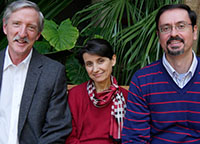 On September 24-25, a Warwick-Monash Alliance funded workshop on Autophagy research was held at Monash University. The workshop was organised by Professor Rodney Devenish (Department of Biochemistry & Molecular Biology, Monash University) and Associate Professor Dr Ioannis P. Nezis (School of Life Sciences, University of Warwick). The workshop included formal presentations, an idea-sharing forum, small group interactions and a public lecture with keynote speaker Professor Ana Maria Cuervo, a world-leader in autophagy research field, from Institute for Aging Research, Albert Einstein College of Medicine in New York. The main focus of the workshop was to bring Warwick and Monash researchers together to collaborate and to develop ideas and concepts for future joint funding.
On September 24-25, a Warwick-Monash Alliance funded workshop on Autophagy research was held at Monash University. The workshop was organised by Professor Rodney Devenish (Department of Biochemistry & Molecular Biology, Monash University) and Associate Professor Dr Ioannis P. Nezis (School of Life Sciences, University of Warwick). The workshop included formal presentations, an idea-sharing forum, small group interactions and a public lecture with keynote speaker Professor Ana Maria Cuervo, a world-leader in autophagy research field, from Institute for Aging Research, Albert Einstein College of Medicine in New York. The main focus of the workshop was to bring Warwick and Monash researchers together to collaborate and to develop ideas and concepts for future joint funding.
Formed in early 2012, the Monash Warwick Alliance represents an innovation in higher education and research and aims to accelerate the exchange of people, ideas and information between Monash University and the University of Warwick.
(Image: Prof Devenish, Prof Cuervo and Prof Nezis)
Marine conservation research in top 20 global impact case studies
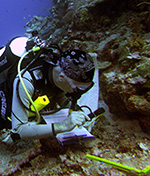 The UK Collaborative on Development Sciences (UKCDS) has listed the School of Life Sciences marine conservation case study as one of its top 20 favourite impact stories showing how research is improving lives of people around the world. The study led by Prof Charles Sheppard was selected from 6,975 impact case studies submitted to the Research Excellence Framework (REF) which is a system used to assess research quality in UK universities.
The UK Collaborative on Development Sciences (UKCDS) has listed the School of Life Sciences marine conservation case study as one of its top 20 favourite impact stories showing how research is improving lives of people around the world. The study led by Prof Charles Sheppard was selected from 6,975 impact case studies submitted to the Research Excellence Framework (REF) which is a system used to assess research quality in UK universities.
The case study shows how Prof Charles Sheppard and colleagues have been co-ordinating new approaches to coral reef conservation, restoration and management, using the coral reefs and islands in the Chagos Archipelago as a reference site. Underpinned by UK research, this British Indian Ocean Territory has now been declared a Marine Protected Area, supporting ecosystem conservation to benefit tropical habitats and help preserve livelihoods in some of the poorest countries in that region.
For full details visit UKCDS Conserving marine environments
(Image courtesy of Anne Sheppard)
Inaugural SLS Undergraduate Project Impact Prize awarded
 The outstanding research of two undergraduate students in SLS has been recognised by them becoming joint recipients of the School’s Undergraduate Project Impact Prize.
The outstanding research of two undergraduate students in SLS has been recognised by them becoming joint recipients of the School’s Undergraduate Project Impact Prize.
Final-year students Archna Shah (pictured) and Sarah Brocklesby performed their research projects in the laboratory of Dr David Roper, and made significant contributions to his programme of research on antimicrobial resistance.
The rapid rise of multi-drug-resistant bacteria is a global healthcare crisis, and new antibiotics are urgently required. Research at Warwick seeks to identify particular structural information on this essential class of enzymes that may lead to a new antibiotic discovery strategy. Archna and Sarah worked in parallel on cloning, expression, purification and crystallisation of tRNA synthetases from the bacteria S. aureus and E. coli respectively. These proteins were required as part of an MRC-funded research grant entitled Multi-Targeting of tRNA synthetases: A paradigm shift in combating Antimicrobial resistance (AMR). The clones that the students produced have now been provided to MRC-funded postdoctoral researcher, Dr Dominico Bellini working at the Diamond Light Source synchrotron facility in Oxfordshire, who has used them to produce protein crystals that enabled totally new X-ray crystal structures of the corresponding tRNA synthetase enzymes to be produced. The first of these structures was determined at a near-atomic resolution of 1.3Å, the day before Archna and Sarah graduated in July 2015 and is the highest resolution structure of this class so far discovered!
Archna and Sarah’s clones have made a pivotal contribution to this project at its very earliest stage and we expect that the project will lead to significant advances in antibiotic drug discovery in the future.
Both students have shown great promise and they have already made the next step towards advancing their research careers: Sarah now works for the biotechnology company ProImmune, based in Oxford, and Archna recently started an MBio industrial placement with Micropathology Ltd at the University of Warwick Science Park.
NERC grant success for Prof Dave Scanlan
 Prof Dave Scanlan has been awarded £386,000 by NERC for his project on 'Revealing a mechanistic understanding of the role of viruses and host nutrient status in modulating CO2fixation in key marine phototrophs'. The research will be carried out in collaboration with Dr Andy Millard from Warwick Medical School, and colleagues at Plymouth Marine Laboratory, and focuses on understanding the impact of viral infection on marine photosynthesis, which has implications for ocean carbon cycling and climate change.
Prof Dave Scanlan has been awarded £386,000 by NERC for his project on 'Revealing a mechanistic understanding of the role of viruses and host nutrient status in modulating CO2fixation in key marine phototrophs'. The research will be carried out in collaboration with Dr Andy Millard from Warwick Medical School, and colleagues at Plymouth Marine Laboratory, and focuses on understanding the impact of viral infection on marine photosynthesis, which has implications for ocean carbon cycling and climate change.
Warwick extends synthetic biology collaborations with Brazil
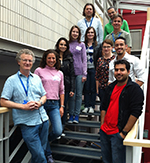 Katherine Denby, Vardis Ntoukakis and Patrick Schafer have been awarded £39,000 for establishing research collaborations between the plant synthetic biology group of Warwick Intregrative Synthetic Biology Centre (WISB) and the Biomass Systems and Synthetic Biology Center (BSSB) at the University of São Paulo.
Katherine Denby, Vardis Ntoukakis and Patrick Schafer have been awarded £39,000 for establishing research collaborations between the plant synthetic biology group of Warwick Intregrative Synthetic Biology Centre (WISB) and the Biomass Systems and Synthetic Biology Center (BSSB) at the University of São Paulo.
The funding from the Warwick–FAPESP Sprint scheme will fund a number of initiatives over two years, with the partnership lead on the Brazilian side by Prof Marie-Anne Van Sluys. Specific activities are planned to strengthen the collaboration and leverage additional research funding. We will build on the success of our Plant Synthetic Biology workshop at Warwick in September 2014 which was attended by 9 Brazilian PhD students and early career scientists, and run a second workshop in early 2016 with increased inclusion of synthetic biology engineering concepts. Two grant writing workshops will be held, one at Warwick and one in São Paulo, to develop proposals for EMBO and FAPESP funding for future Synthetic Biology workshops and joint applications for BBSRC-FAPESP research grant funding. Specific research exchanges by early career scientists and undergraduate students in both directions will build the collaboration at all levels.
IAS Fellowship success for PhD students
School of Life Sciences PhD students Max Newbert and Nicola Galley have been awarded Early Career Fellowships by the University of Warwick’s Institute of Advanced Study (IAS). The fellowships are designed to support Warwick doctoral candidates in the transition phase between their doctoral and postdoctoral careers. In addition to continuing research carried out during their PhD projects, Fellows have the opportunity to participate in collegiate and career development activities including leading a research-orientated workshop for other members of the IAS, assisting at the IAS-led Research Showcase events, and attending the weekly Academic Careers and Employment programme.
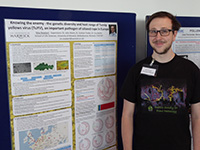 Max’s fellowship will focus on continuing and publishing research completed during the course of his BBSRC PhD studentship entitled 'The genetic diversity of Turnip yellows virus in oilseed rape (Brassica napus) in Europe, pathogenic determinants, new sources of resistance and host range'. Max’s studentship received extra funding from the Perry Foundation, a UK charity that promotes education and research connected with agriculture or food production for the benefit of the public. Turnip yellows virus (TuYV) is a major threat to oilseed rape and other brassicas reducing yields by up to 65%. Very high levels of virus have been detected in this year’s crop and there is evidence of 20-24% reduction in yield due to TuYV, from crops harvested so far. Max’s work has highlighted the prevalence of the virus in mainland Europe, identified isolates with novel host ranges and identified significant and new information on the phylogeny of the species, all of which are important for breeding resistant plant lines. The fellowship will be carried out at Wellesbourne under the supervision of Dr John Walsh.
Max’s fellowship will focus on continuing and publishing research completed during the course of his BBSRC PhD studentship entitled 'The genetic diversity of Turnip yellows virus in oilseed rape (Brassica napus) in Europe, pathogenic determinants, new sources of resistance and host range'. Max’s studentship received extra funding from the Perry Foundation, a UK charity that promotes education and research connected with agriculture or food production for the benefit of the public. Turnip yellows virus (TuYV) is a major threat to oilseed rape and other brassicas reducing yields by up to 65%. Very high levels of virus have been detected in this year’s crop and there is evidence of 20-24% reduction in yield due to TuYV, from crops harvested so far. Max’s work has highlighted the prevalence of the virus in mainland Europe, identified isolates with novel host ranges and identified significant and new information on the phylogeny of the species, all of which are important for breeding resistant plant lines. The fellowship will be carried out at Wellesbourne under the supervision of Dr John Walsh.
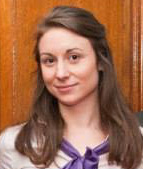 Nicola’s fellowship will build on research undertaken during her BBSRC PhD studentship on 'The role of species-specific modifications in peptidoglycan biosynthesis'. Antimicrobial Resistance (AMR) is a catastrophic threat to human health, dramatically reducing the effectiveness of drugs that we have come to rely on in common medical practice. It has been predicted that if resistance continues to grow at the same rate, 10 million people will die every year as a direct result of AMR infections by 2050. Understanding the bacterial cell wall and its main component, peptidoglycan, is vitally important in the development of new antimicrobials. Penicillin binding proteins (PBPs) are responsible for making peptidoglycan and are excellent targets for antimicrobial drugs as they are essential for cell viability. Nicola’s research identified a critical PBP substrate recognition phenomenon in Streptococcus pneumonia that has led to significant advances in understanding the cell wall synthesis process. During the fellowship Nicola aims to write several high-impact publications, present her research at international interdisciplinary conferences, and organise a symposium at Warwick on the topic of antimicrobial resistance. The fellowship will be carried out under the supervision of Dr David Roper and Prof Chris Dowson.
Nicola’s fellowship will build on research undertaken during her BBSRC PhD studentship on 'The role of species-specific modifications in peptidoglycan biosynthesis'. Antimicrobial Resistance (AMR) is a catastrophic threat to human health, dramatically reducing the effectiveness of drugs that we have come to rely on in common medical practice. It has been predicted that if resistance continues to grow at the same rate, 10 million people will die every year as a direct result of AMR infections by 2050. Understanding the bacterial cell wall and its main component, peptidoglycan, is vitally important in the development of new antimicrobials. Penicillin binding proteins (PBPs) are responsible for making peptidoglycan and are excellent targets for antimicrobial drugs as they are essential for cell viability. Nicola’s research identified a critical PBP substrate recognition phenomenon in Streptococcus pneumonia that has led to significant advances in understanding the cell wall synthesis process. During the fellowship Nicola aims to write several high-impact publications, present her research at international interdisciplinary conferences, and organise a symposium at Warwick on the topic of antimicrobial resistance. The fellowship will be carried out under the supervision of Dr David Roper and Prof Chris Dowson.
Congratulations to Max and Nicola on their success!
Dr Liz Fullam awarded Innovation Grant to combat antimicrobial resistance in TB
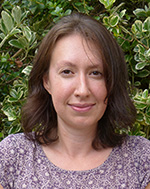 Dr Liz Fullam, a Wellcome Trust/Royal Society Sir Henry Dale Fellow in the School of Life Sciences, has been awarded a £237,000 Innovation Grant from the MRC and BBSRC’s Tackling Anti-Microbial Resistance (AMR) initiative. The award is in collaboration with Dr Matthew Gibson (Department of Chemistry) and is one of eight grants awarded in this round. The AMR initiative is a cross-Council call to drive forward innovative research in order to: understand the resistant bacterium at molecular, cell and community levels; understand the context of host/pathogen interactions in humans or animals; identify and validate novel targets (both host and bacterial) for new anti-bacterials; understand transmission of resistance in human or animal hosts.
Dr Liz Fullam, a Wellcome Trust/Royal Society Sir Henry Dale Fellow in the School of Life Sciences, has been awarded a £237,000 Innovation Grant from the MRC and BBSRC’s Tackling Anti-Microbial Resistance (AMR) initiative. The award is in collaboration with Dr Matthew Gibson (Department of Chemistry) and is one of eight grants awarded in this round. The AMR initiative is a cross-Council call to drive forward innovative research in order to: understand the resistant bacterium at molecular, cell and community levels; understand the context of host/pathogen interactions in humans or animals; identify and validate novel targets (both host and bacterial) for new anti-bacterials; understand transmission of resistance in human or animal hosts.
The two-year project will focus on Mycobacterium tuberculosis, one of the largest causes of mortality from a single infectious agent world-wide. The research groups of Dr Liz Fullam and Dr Matt Gibson will combine their expertise and utilise chemical biology to identify new therapeutics and diagnostics for this deadly pathogen.
Plant science collaboration with Brazil to improve vegetable crops
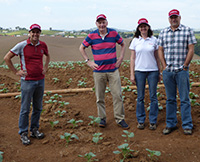 Dr John Walsh
Dr John Walsh , Associate Professor in the School of Life Sciences, and his collaborators have been awarded £15,000 for a research project on the characterisation of Potyviruses infecting vegetable crops in Brazil. The project was funded through the FAPESP SPRINT
, Associate Professor in the School of Life Sciences, and his collaborators have been awarded £15,000 for a research project on the characterisation of Potyviruses infecting vegetable crops in Brazil. The project was funded through the FAPESP SPRINT scheme (São Paulo Researchers in International Collaboration), which aims to encourage and promote the advancement of scientific research through partnerships between researchers in São Paulo State and overseas. The University of Warwick is one of only five UK institutions that has partnered with the São Paulo Research Foundation (FAPESP) to support this scheme.
scheme (São Paulo Researchers in International Collaboration), which aims to encourage and promote the advancement of scientific research through partnerships between researchers in São Paulo State and overseas. The University of Warwick is one of only five UK institutions that has partnered with the São Paulo Research Foundation (FAPESP) to support this scheme.
Dr Walsh’s project will be carried out in collaboration with Prof Elliot Kitajima from the University of São Paulo’s Department of Plant Pathology and Nematology in Piracicaba and Dr Marcelo Eiras from the Instituto Biologico in São Paulo. Initial activities to develop this partnership were supported by the University of Warwick’s Brazil Partnership Fund in 2014. The Brazilian operation of the commercial seed company Sakata are also involved in the research programme.
Potyviruses cause significant losses in agricultural, pastoral, horticultural and ornamental crops. This project focusses on Turnip mosaic virus (TuMV), which causes diseases in the economically important brassica family of crops including broccoli, cauliflower, cabbage, turnip and oilseed rape. Through determining the diversity of TuMV and investigating broad-spectrum resistance to the virus the team is expecting to identify naturally occurring resistance genes which can then be introduced into commercial crop lines. The collaboration brings together complementary expertise in plant science research which will lead to significant synergies and knowledge exchange, but also has the potential to generate substantial societal and economic benefits through collaboration with industry and the resulting exploitation of intellectual property.
Warwick students to present at MIT in international synthetic biology competition
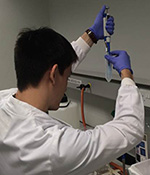 Undergraduate and newly graduated students from Warwick University will be travelling to MIT, Boston, this September 24-28 to compete in a global synthetic biology competition.
Undergraduate and newly graduated students from Warwick University will be travelling to MIT, Boston, this September 24-28 to compete in a global synthetic biology competition.
The team is interdisciplinary, with students from distinct academic fields bringing different skills and expertise to the table. These departments involve Maths, Physics, Engineering and Life Sciences, with Biomedical, Biochemical and Biological Sciences represented.
The team will be supported with advice from academic and research staff, including Prof Alfonso Jaramillo and Prof John McCarthy, among others, at the School of Life Sciences.
GARNish newsletter puts spotlight on plant science at Warwick
 The latest GARNish newsletter highlights plant science in Life Sciences, profiling the work of our academics.
The latest GARNish newsletter highlights plant science in Life Sciences, profiling the work of our academics.
'Plant science research at the University of Warwick is characterised by the breadth of expertise - from fundamental molecular mechanisms to projects with direct application to industry. We have world-class basic science in signalling, gene regulation, development, plant– environment (microbes, virus, soil) interactions, and evolution through to pest management, crop genetics and genomics underpinning the development of new varieties.'
Read the newsletter (pdf)
